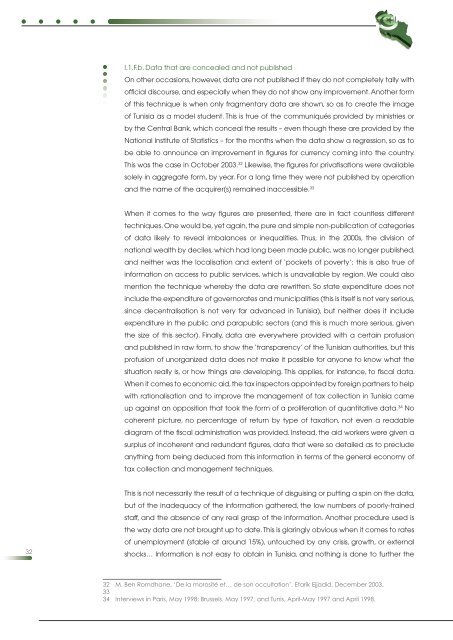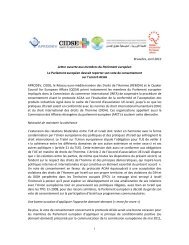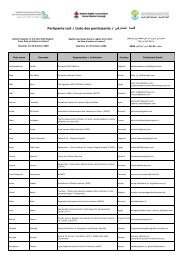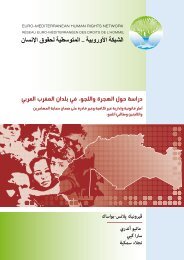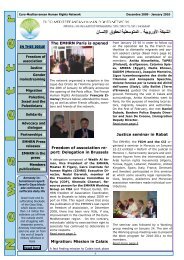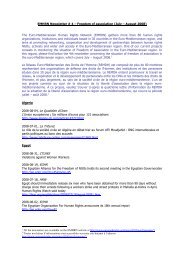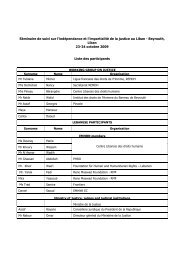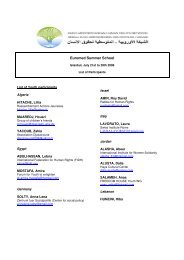tunisia after 14 january and its social and political economy - Refworld
tunisia after 14 january and its social and political economy - Refworld
tunisia after 14 january and its social and political economy - Refworld
Create successful ePaper yourself
Turn your PDF publications into a flip-book with our unique Google optimized e-Paper software.
I.1.F.b. Data that are concealed <strong>and</strong> not publishedOn other occasions, however, data are not published if they do not completely tally withofficial discourse, <strong>and</strong> especially when they do not show any improvement. Another formof this technique is when only fragmentary data are shown, so as to create the imageof Tunisia as a model student. This is true of the communiqués provided by ministries orby the Central Bank, which conceal the results – even though these are provided by theNational Institute of Statistics – for the months when the data show a regression, so as tobe able to announce an improvement in figures for currency coming into the country.This was the case in October 2003. 32 Likewise, the figures for privatisations were availablesolely in aggregate form, by year. For a long time they were not published by operation<strong>and</strong> the name of the acquirer(s) remained inaccessible. 33When it comes to the way figures are presented, there are in fact countless differenttechniques. One would be, yet again, the pure <strong>and</strong> simple non-publication of categoriesof data likely to reveal imbalances or inequalities. Thus, in the 2000s, the division ofnational wealth by deciles, which had long been made public, was no longer published,<strong>and</strong> neither was the localisation <strong>and</strong> extent of ‘pockets of poverty’; this is also true ofinformation on access to public services, which is unavailable by region. We could alsomention the technique whereby the data are rewritten. So state expenditure does notinclude the expenditure of governorates <strong>and</strong> municipalities (this is <strong>its</strong>elf is not very serious,since decentralisation is not very far advanced in Tunisia), but neither does it includeexpenditure in the public <strong>and</strong> parapublic sectors (<strong>and</strong> this is much more serious, giventhe size of this sector). Finally, data are everywhere provided with a certain profusion<strong>and</strong> published in raw form, to show the ‘transparency’ of the Tunisian authorities, but thisprofusion of unorganized data does not make it possible for anyone to know what thesituation really is, or how things are developing. This applies, for instance, to fiscal data.When it comes to economic aid, the tax inspectors appointed by foreign partners to helpwith rationalisation <strong>and</strong> to improve the management of tax collection in Tunisia cameup against an opposition that took the form of a proliferation of quantitative data. 34 Nocoherent picture, no percentage of return by type of taxation, not even a readablediagram of the fiscal administration was provided. Instead, the aid workers were given asurplus of incoherent <strong>and</strong> redundant figures, data that were so detailed as to precludeanything from being deduced from this information in terms of the general <strong>economy</strong> oftax collection <strong>and</strong> management techniques.32This is not necessarily the result of a technique of disguising or putting a spin on the data,but of the inadequacy of the information gathered, the low numbers of poorly-trainedstaff, <strong>and</strong> the absence of any real grasp of the information. Another procedure used isthe way data are not brought up to date. This is glaringly obvious when it comes to ratesof unemployment (stable at around 15%), untouched by any crisis, growth, or externalshocks… Information is not easy to obtain in Tunisia, <strong>and</strong> nothing is done to further the32 M. Ben Romdhane, ‘De la morosité et… de son occultation’, Etarik Ejjadid, December 2003.3334 Interviews in Paris, May 1998; Brussels, May 1997, <strong>and</strong> Tunis, April-May 1997 <strong>and</strong> April 1998.


